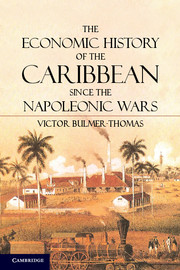Book contents
- Frontmatter
- Contents
- List of Figures
- List of Tables
- Preface
- List of Abbreviations
- 1 Introduction
- PART I THE CARIBBEAN IN THE AGE OF FREE TRADE
- PART II THE CARIBBEAN IN THE AGE OF PREFERENCES
- 8 The Core and the Caribbean
- 9 Caribbean Foreign Trade
- 10 The Caribbean Domestic Economy
- 11 The Rise, Decline and Fall of the Belizean Economy before Independence
- PART III THE CARIBBEAN IN THE AGE OF GLOBALISATION
- Statistical Appendix
- Notes on A Tables
- Notes on B Tables
- Notes on C Tables
- Notes on D Tables
- Bibliography
- Index
9 - Caribbean Foreign Trade
Published online by Cambridge University Press: 05 November 2012
- Frontmatter
- Contents
- List of Figures
- List of Tables
- Preface
- List of Abbreviations
- 1 Introduction
- PART I THE CARIBBEAN IN THE AGE OF FREE TRADE
- PART II THE CARIBBEAN IN THE AGE OF PREFERENCES
- 8 The Core and the Caribbean
- 9 Caribbean Foreign Trade
- 10 The Caribbean Domestic Economy
- 11 The Rise, Decline and Fall of the Belizean Economy before Independence
- PART III THE CARIBBEAN IN THE AGE OF GLOBALISATION
- Statistical Appendix
- Notes on A Tables
- Notes on B Tables
- Notes on C Tables
- Notes on D Tables
- Bibliography
- Index
Summary
This chapter explores the foreign trade of the Caribbean from 1900 to 1960. Exports of goods remained the major determinant of the performance of the Caribbean economies, providing the foreign exchange for imports, the revenue for government expenditure and the resources to service the public debt. Exports of services, however, in some of the smaller countries replaced commodity exports as the main engine of growth after the Second World War. This drove a wedge between the performance of merchandise exports and total imports in a few cases.
In South America and Mexico this was the period when import substitution came to play an increasingly important role as the republics built up their industrial base behind high tariff walls. This did not happen to anything like the same extent in the Caribbean, but there was some import substitution in agriculture – especially in the Second World War – and a few cases of import substitution in manufacturing on the larger islands (see Chapter 10.1).
The first section of the chapter looks at the commodity structure of exports. The absolute volume of sugar exports expanded greatly over the whole period, but there were marked cycles in its evolution. The relative importance of sugar, however, rose and then fell – just as it had done in the nineteenth century. Over the whole period, when constant prices are used, about half of all domestic exports came from products other than sugar; it therefore is a mistake to assume that sugar was completely dominant. Commodities remained the most important component of domestic exports, and minerals started to occupy a much more significant role than in the nineteenth century. Manufactured exports (other than those made from sugarcane and tobacco leaf) were also important by the end of the period, but they were heavily concentrated in Puerto Rico.
- Type
- Chapter
- Information
- The Economic History of the Caribbean since the Napoleonic Wars , pp. 228 - 256Publisher: Cambridge University PressPrint publication year: 2012



